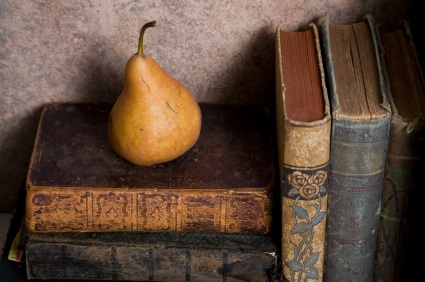Each of the five cookbook clubs below has its own flavor. You’ll also find advice from a seasoned cookbook club organizer about how to start your own group.
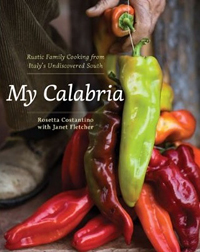
My Calabria, written by Rosetta Costantino (with Janet Fletcher) and photographs by Sara Remington
Cooks’ Book Club — Berkeley
Three fixtures of Berkeley’s chi chi shopping strip on 4th Street — Books Inc., Cafe Rouge, and The Pasta Shop — have joined forces to create a monthly meet up mixing food, wine, and conversation. The club kicks off this Tuesday at 6 p.m. at Cafe Rouge with Rosetta Costantino’s cookbook My Calabria: Rustic Family Cooking From Italy’s Undiscovered South. (Read an earlier BAB post on My Calabria.) Subsequent events will be held on the fourth Tuesday of the month, rotating through the three locations.
Costantino will read and share recipes, including stuffed pizza with chard and dill, salt baked sea bass, and cauliflower salad, all paired with Southern Italian vino. Books will be on sale, dishes and drinks sampled, ingredients made available, and discussion will no doubt follow. The event costs $20; admission prices may vary some for each program, depending on what food and wine is on offer.
Up next for the Cooks’ Book Club: Gordon Edgar, author of Cheesemonger: My Life on the Wedge, on February 22 at The Pasta Shop, followed by dessert diva Alice Medrich, author of the Chewy, Gooey, Crispy, Crunchy, Melt-In-Your-Mouth Cookies on March 22 at Cafe Rouge.
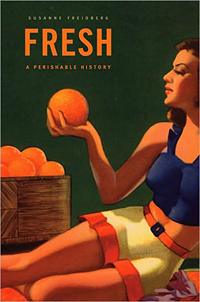
Fresh by Susanne Friedberg is the book of choice for February's Food Lit Club at 18 Reasons
18 Reasons Food Lit Club — San Francisco
Heather Knape decided to convene a Food Lit Club at 18 Reasons just over a year ago when someone at her regular book group suggested she might want to pick some non-food books for the group to read. The life-long food and farm lover, who blogs about feeding her family at eating dirt, realized she needed a different club to dish about all things edible.
Members make a three-month commitment to the club, after which you can decide whether you want to continue or choose to give up your coveted spot to a newcomer.
Books can be bought from Omnivore Books (20 percent of profits go to fund the work of the nonprofit food group 18 Reasons) or you can bring your own. The group gathers on the third Sunday of the month from 4 p.m. to 6 p.m. at 18 Reasons. It’s a B.Y.O. nibbles kind of deal, typically a rotating snack roster or potluck affair.
Each quarter the group reads something old, something new, and something local, so authors can come too. This month the group discussed Home Cooking by Laurie Colwin. February’s pick is Fresh by Susanne Friedberg, followed in March by An Extravagant Hunger: The Passionate Years of M.F.K. Fisher by Anne Zimmerman, who will put in an appearance. Previous picks include Cheesemonger, The Righteous Porkchop: Finding a Life and Good Food Beyond Factory Farms by Nicolette Hahn Niman and Four Fish: The Future of the Last Wild Food by Paul Greenberg.
Knape moderates the meet ups and sends out discussion questions in advance.
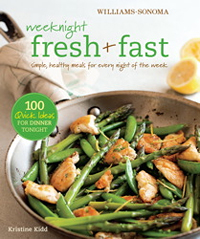
Kristine Kidd's book Weeknight Fresh + Fast is the featured cookbook in February at Williams-Sonoma
Williams-Sonoma Cookbook Club — Los Gatos, Monterey, Palo Alto, Pleasanton, Sacramento, San Francisco, and Walnut Creek
The high-end kitchen store Williams-Sonoma’s cookbook club offers cooking classes by in-house chefs showcasing recipes in a cookbook featured each month, often one of their own titles.
The classes cost $75, and include cooking tips and techniques, a three-course tasting menu, and the cookbook. Reservations are required and space is limited; class times vary by store location.
Last month the store featured Mad Hungry: Feeding Men and Boys by Lucinda Scala Quinn, next up is the Williams-Sonoma Weeknight Fresh + Fast by Kristine Kidd, the former food editor of Bon Appetit, followed in March by Williams-Sonoma Good Food to Share by Sara Kate Gillingham-Ryan, founder of the popular cooking site The Kitchn.
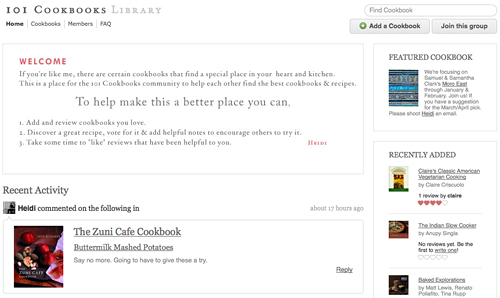
At 101 Cookbooks Heidi Swanson's library allows food lovers from around the world to connect over cookbooks
101 Cooks books Library — Anywhere and Everywhere
You don’t even have to leave home to connect with other cookbook lovers. Heidi Swanson’s home-grown food blog 101 Cookbooks recently launched 101 Cookbooks Library, where readers can connect in cyberspace with fellow food aficionados to review cookbooks, highlight their favorite dishes, and offer recipe tweaks based on their own kitchen experience.
A couple of standout reviewers have emerged on Swanson’s site, which draws an enthusiastic, healthy cooking crowd with culinary smarts. It’s early days, but Swanson says cookbooks published long ago could experience a revival with a new generation of cooks through her forum, which attracts participants from as far away as Australia and Amsterdam. “I love seeing the interaction between members,” says Swanson. “You see friendships emerging and people helping each other, often from opposite ends of the globe.”
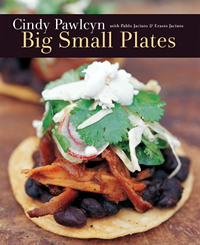
Wine Country chef Cindy Pawlcyn's Big Small Plates was picked by other culinary professionals for discussion by the Napa Cook/Book Club
Cook/Book Club — Napa
Started five years ago by Napa Valley Register food columnist Betty Teller, the Cook/Book Club has a pretty impressive professional pedigree, with just a few civilians in the mix. We’re talking cookbook author Janet Fletcher, pastry chef Annie Baker, chefs, foragers, Slow Food folks, wine guys — even a registered dietician who works with The Biggest Loser TV show. The group meets every two months to dine and dish. Everyone picks a recipe from the featured cookbook to make and during the dinner each person describes what they made, and offer their thoughts on the recipe and the book in general. The conversation flows. One hard and fast rule: No recipe tweaking. Tough for veteran chefs.
Local authors whose books have been featured by group members have even joined the festivities, including Joyce Goldstein (Italian Slow and Savory), Flo Braker (Baking for All Occasions), Joey Altman (Without Reservations), and Cindy Pawlcyn (Big Small Plates). “As the group has evolved –and no one has dropped out — this has become a truly great dinner party with phenomenal food and excellent company, that has its basis as a book club,” explains Teller. “We have our theoretical discussion questions which we largely ignore.”
